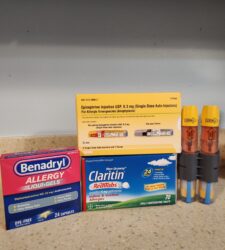It has been brought to my attention that some restaurants that offer to serve melted butter are not using real butter. They are using a liquid butter alternative. The Phase Original Liquid alternative is Vegetable oil. The restaurants use it for its versatility and cost-effectiveness. The Phase Vegetable Oil is helpful for grilling and sauteing also. It won’t burn scorch splatter or foam. Per tablespoon, it has 14 g of fat and 3 grams of saturated fat. It is made from a liquid and hydrogenated soybean oil. The soybean oil is from sunflower lecithin. Because this lecithin is not the lecithin from egg it is a product that is considered safe for people who have an egg allergy.
Restaurants use Phase Vegetable oil in place of using melted butter. Their application is to sauté or season the vegetables and proteins/meats by brushing some on the food while it cooks. They also use it on rolls and pizza crust as well as in dipping sauces and other recipes.
I still prefer butter as it is all-natural. But at least by using this product, it may not result in an egg allergen reaction.
Comparison between Butter, Phase Vegetable Oil, and Country Crock Avocado Oil Plant Butter. The good news is that there are no egg additives in any of these.
| Butter | Phase Vegetable Oil | Country Crock Plant Butter |
| Serving 1 Tbsp 100 Calories | Serving 1 Tbsp 120 Calories | Serving 1 Tbsp 100 Calories |
| Ingredients: Sweet cream, Salt, Milk | Ingredients; Liquid and Hydrogenated soybean oil, less than 2% Salt, Sunflower Lecithin, Natural Flavor, Beta carotene (color) | Ingredients: Blend of plant-based oil (Palm Kernel, Palm Fruit, Canola, Avocado), Water, Salt, Pea Protein, Sunflower Lecithin, Citric acid vitamin A Palmitate, Natural Flavor, Beta Carotene |
| Total Fat 11 g | Total Fat 14 g | Total Fat 11 g |
| Saturated Fat 7 g | Saturated Fat 3g | Saturated Fat 5g |
| Sodium 90 mg | Sodium 55 mgm | Sodium 110 mg |
| Chloresterol 30 mg | Chloresterol not listed | Chloresterol 0 |
Partially hydrogenated oil contains Trans fat and can raise cholesterol and result in some health risks for some people. The Food and Drug Administration (FDA) declared in 2015 that partially hydrogenated oil is not safe and that removing it from food could prevent thousands of heart attacks each year. As of 2018 the FDA still allows products to use fully hydrogenated oils. It has phased out partially hydrogenated oils.
Products on the market that used partially hydrogenated oils are mostly baked goods, stick margarine, frosting, coffee creamers, and snack foods. The use of hydrogenated oil (Trans Fat) helps manufacturers to keep foods fresher for a longer period. Just because a product is considered good for a person to consume.

